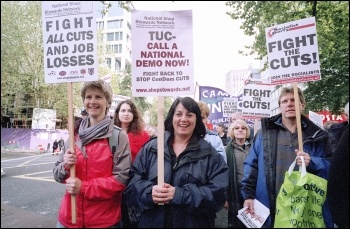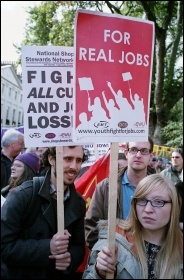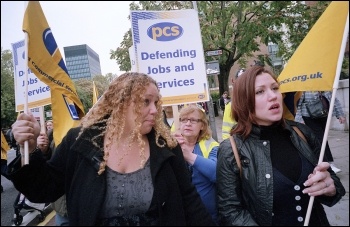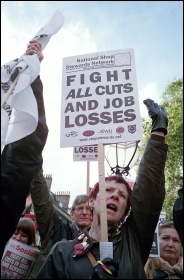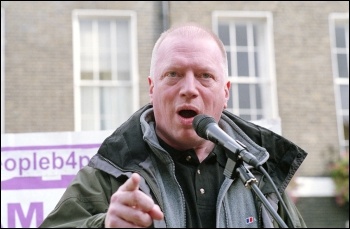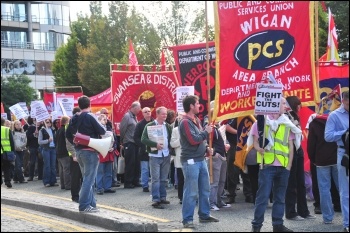National Shop Stewards Network conference 22 January
Discussing an NSSN anti-cuts campaign
In the debates and discussions that have taken place in the run up to the NSSN special anti-cuts conference on 22 January, a number of assumptions and misunderstandings have been raised in meetings around the country and also circulated on the internet.
The Socialist interviewed two Socialist Party members who are also NSSN officers, Bill Mullins (NSSN co-organiser) and Rob Williams (NSSN vice-chair) to explain some of the facts and differences that have arisen.
1. At its special conference this Saturday, 22 January, the National Shop Stewards Network is discussing a proposal to launch an anti-cuts campaign., Why has this proposal been made?
The NSSN is uniquely placed to launch an effective anti-cuts campaign, as it is a national organisation that is based on trade union and workplace representatives across all unions.
Over the Christmas period, warning notices of redundancy were sent by local authorities to 118,000 council workers. The best way to defeat cuts of this magnitude, and all the other cuts that the Con-Dem government is intent on carrying through, will be by the trade unions preparing for coordinated strike action, linking up with the local community-based anti-cuts campaigns.
As the NSSN has a base in workplaces, it is in a very strong position to help draw together the anti-cuts campaigning of trade unionists with that of local communities, students, other young people etc.
The NSSN already has a record of organising successful anti-cuts events, including the first conference that took place after Osborne’s initial budget cuts were announced, a lobby of the last TUC congress in Manchester and helping to organise several regional anti-cuts demonstrations on 23 October 2010.
2. Critics of the proposal have said that there are already two national anti-cuts bodies in existence, the Coalition of Resistance (CoR) and Right to Work (RtW), and unity is paramount. What would you say on this issue?
We are in favour of unity, but at present there are important political and organisational differences within the anti-cuts movement that need to be discussed and debated.
In particular, we need a national anti-cuts campaign that opposes ALL cuts, and we don’t believe that CoR and RtW are taking this position and preparing to defend it in reality.
Only a position against all cuts can prevent workers from being divided over which jobs and services should be cut, and keep the movement united. We also have differences with CoR and RtW on the issue of Labour councils.
This isn’t an issue for the future, as workers are facing sackings and attacks on terms and conditions from Labour councils now. We’ll work alongside any Labour councillor who is prepared to oppose the cuts by voting against them inside the council chamber and helping to build campaigns against them outside the chamber.
But taking an uncritical attitude towards Labour councillors, and Greens – and giving them platforms on demos etc to speak as reps of the anti-cuts movement – before they have committed to such a stance, will mislead workers who are being attacked and eventually put them off the anti-cuts movement.
We believe there are differences too regarding attitude to the trade union leaders. We see it as important that the anti-cuts movement acts as a lever on the trade union leaders from below, to push them to organise and coordinate strike action.
We don’t believe that CoR and RtW will act as a lever in this way, putting the necessary demands on the trade union leaders. The danger is that if they are uncritical, they risk acting as a crutch for union leaders who don’t lead the action that is necessary.
The NSSN actually pre-dates CoR and RtW, by years in fact (it was set up in 2007) and it was the first to organise an anti-cuts conference after the general election.
The idea of the NSSN being involved in anti-cuts campaigning is not new, it was raised at the NSSN conference in June 2010, when the policy of linking up with local community based anti-cuts campaigns was part of a statement agreed at that event.
With the election of the Con-Dem government, we knew that a ‘fight to end all fights’ was looming. On the issue of unity, it’s worth noting that we are not proposing that the NSSN anti-cuts campaign, if it’s set up on Saturday, will set up new local anti-cuts alliances to rival those that have already been established.
Unfortunately RtW is in the process of doing this in a number of areas.
We also have differences with CoR and RtW on the issue of democracy. At its conference, CoR did not have any debate and discussion in its plenary sessions, just platform speeches.
Neither does the SWP, that controls RtW, have a history of allowing debate and discussion at their public events, inviting minority opinions to be expressed.
London anti-cuts demonstration jointly called by the NSSN, RMT, NUT, FBU, PCS and other unions, photo Paul Mattsson (Click to enlarge: opens in new window)
3. The steering committee and officers’ committee of the NSSN were divided on the new proposal., What were the different positions?
We believed that the NSSN had to definitely react to the cuts agenda of the government, and were surprised by the vehement oppostion from some of the other NSSN officers and steering committee members.
The vote at the steering committee was 21:17 in favour of setting up an anti-cuts campaign committee. The 17 against were mainly divided into three blocs, those who supported CoR, those who supported RtW (and were in fact members of it), and those who didn’t think it was part of the remit of NSSN to go beyond being a network of workplace and trade union reps.
The supporters of CoR and RtW seemed to be expressing a political vested interest in leaving the road clear for those two organisations. Those in the third category were mostly genuine in their arguments, but we couldn’t support their desire to keep the NSSN in a box and not place it at the heart of the anti-cuts movement nationally.
The job of active trade unionists right now is to get involved in the anti-cuts movement.
4. Is it proposed that the new NSSN anti-cuts campaign, if set up, will coordinate its work with the other national anti-cuts organisations?
Yes, we want to work with the other national anti-cuts organisations and have already made this clear. We have tried to link up with the other organisations to discuss common plans and avoid clashes of activities.
But if they don’t oppose all cuts, then we’ll be able to work with them on some issues but not others. Without the NSSN having its own anti-cuts campaign, its distinct programme and methods will not be heard in the anti-cuts movement, and we see this as vital.
The NSSN has already been playing a role in this respect; the left trade union leaders invited us to a Trade Union Coordinating Group meeting, as well as reps from the other anti-cuts bodies, to discuss the anti-cuts work of the left-led trade unions.
Hopefully a national anti-cuts conference organised by these unions will take place soon. The left trade union leaders must come to the fore in taking their own initiatives and putting pressure on the TUC, and the NSSN has a crucial role to play in this and in building support for their initiatives at rank and file level.
If the left union leaders as a whole don’t do what’s needed, then the NSSN will have to continue to campaign to build a movement that can do what’s necessary to defeat the cuts.
We welcome the support given to the proposal for a NSSN anti-cuts campaign by RMT general secretary Bob Crow and RMT president Alex Gordon, and this shows that the NSSN is on the right track.
Through discussion we were able to clear up any doubts they had.
5. As you’ve said, there was no debate allowed in the main sessions of the Coalition of Resistance conference on 27 November 2010., How will the NSSN conference differ from this?
The bulk of the NSSN special conference – nearly three hours – will be devoted to debate on the way forward. The two distinct positions will be put forward at the start.
The steering committee majority will propose that an anti-cuts campaign should be set up and that an anti-cuts committee should be elected that can act rapidly in response to events.
The steering committee minority will propose that we don’t set up such a campaign, and that the NSSN carries on with ‘business as usual’, without a particular role in the anti-cuts movement.
Equal time will be allocated to speakers against and for the main motion.
London anti-cuts demonstration jointly called by the NSSN, RMT, NUT, FBU, PCS and other unions, photo Paul Mattsson (Click to enlarge: opens in new window)
6., Has agreement been reached on the agenda and speakers for the conference?
Yes, the NSSN officers met on 13 January and agreed the agenda, timings, chairs, and platform speakers. Despite what our opponents say, this will be the most democratic anti-cuts conference that has yet taken place.
It is worth noting that there has been a period of six weeks prior to the conference for discussion on the steering committee’s central proposal. The debate has sometimes been sharp, but we’re confident that it is raising the level of understanding of everyone, and that the conference on Saturday will do this further.
This democratic debate and discussion is part of clarifying issues and preparing the anti-cuts movement for the fight that it has to engage in. It is no good to just have rallies with lots of platform speakers and no genuine debate.
There should be nothing to fear from democratic debate, and in fact the Socialist Party has argued for the maximum time for this at the NSSN conference.
7. Why is voting on whether the new campaign is initiated being restricted to workplace and trade union representatives?
This is because the NSSN was set up by workplace and trade union representatives, as a body predominantly for rank and file trade unionists across all the unions.
So it is the right of those representatives to take the decision on whether the NSSN sets up an anti-cuts campaign, it is in line with how the NSSN is organised.
To do otherwise would be to change the character of the NSSN. Delegates from local community anti-cuts campaigns will be able to particpate in the debate however, and if the new anti-cuts campaign is agreed they will be able to vote on who will be on the anti-cuts committee that will lead the campaign.
8. What is the proposed structure of the new anti-cuts campaign? Will it seek affiliations from local anti-cuts alliances?
If the campaign is agreed, we are proposing that an anti-cuts committee is elected consisting of six workplace/union reps, four local community anti-cuts alliance reps and the chair and secretary of the NSSN.
We will propose there is some flexibility to allow others to be co-opted onto the committee according to the needs at each stage – for example if a union is taking national strike action, we would like to be able to invite a representative from that union to help plan activity etc.
Regarding support and affiliations, the new committee would need to discuss exactly how the campaign should be built. In the lively anti-cuts movement that is developing, local alliances may initially choose to send delegates and make affiliations to more than one of the national bodies, but over time, as these bodies are tested out in the struggles that take place, the local alliances will make an assessment of how best they can link their campaign with others nationally.
We are not proposing that the NSSN sets up its anti-cuts campaign as THE national anti-cuts campaign – only that it should exist alongside the other campaigns, and be able to fully engage in the political debates that will inevitably occur.
Of course though, the NSSN anti-cuts body would welcome all support and affiliations that are offered to it.
9., Will the new campaign stand candidates in elections?
No it won’t. Socialist Party members on the steering committee did originally propose that the NSSN should support local anti-cuts alliance candidates who decide to stand in elections, but we withdrew this proposal, in the interests of unity, as it was opposed by others.
Nonetheless, the Socialist Party is encouraging anti-cuts alliances to stand candidates in the May elections under the banner of the Trade Unionist and Socialist Coalition (TUSC).
TUSC has organised a conference on the same day as the NSSN conference (this Saturday), straight after the NSSN conference, to discuss this issue of standing candidates.
10. The NSSN has been a successful network for aiding workers’ struggles and for putting pressure on the trade unions and TUC to act., Will the NSSN continue in its present form, and be able to go on with this work?
Yes, whatever way the vote goes on Saturday, the NSSN will continue to exist, and we will make this clear at the conference. The next normal conference of the NSSN is scheduled for June 2011, so that event will be an opportunity to discuss the further development of the NSSN whether it has an anti-cuts campaign agreed this Saturday or not.
Joint statement on NSSN anti-cuts conference
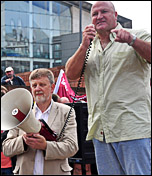
Bob Crow, Railway workers union general secretary, RMT, addresses NSSN lobby of TUC, photo Suleman Civi
Statement on meeting between Bob Crow (RMT general secretary), Alex Gordon (RMT president), Bill Mullins (Socialist Party and co-organiser of the NSSN) and Linda Taaffe (Socialist Party and secretary of the NSSN)
A successful meeting was held which illuminated our agreement on a number of issues, including the vital importance of striving to convince the whole trade union movement to mobilise in a broad, united campaign against austerity cuts around the slogan of ‘No to all cuts in jobs and services’.
Bob Crow and Alex Gordon agree with the proposal of the NSSN steering committee of 4 December 2010 to launch an anti-cuts campaign around that slogan.
We also agree with the recent proposal made by Matt Wrack (FBU, General Secretary) that fighting trade unions can and should take a leading role in this debate by initiating a broad based anti-cuts conference and inviting the various campaigns and organisations to participate in building a genuine and democratic campaign which could establish itself as an important focus of leadership in the coming period.
A number of misunderstandings were clarified. Linda Taaffe and Bill Mullins explained that the steering committee was not proposing to change the constitution of the NSSN in any way, but was only arguing for an additional campaigning anti-cuts committee to be founded in order that the NSSN can play a full part alongside community organisations and political parties in building a united movement against austerity cuts.
They also explained that the steering committee was not proposing that the NSSN, nor the anti-cuts campaign (were it to be set up by the conference on 22nd January), would stand candidates in elections.
The meeting agreed to urge all opponents of the cuts to attend the anti-cuts conference on 22nd January in order to take part in the discussion on what the NSSN steering committee is actually proposing.
Wednesday 12 January 2011
Fight public sector cuts!
Defend public services!
Saturday 22nd January 2011
11.30am to 3.30pm
South Camden Community School, Charrington Street, London NW1 1RG
All anti-cuts campaigns, trade union branches, trades councils and workplace organisations are invited to send delegates and visitors
Registration from 10.30am
The NSSN is the union rank and file body founded by the RMT transport union in 2007. It has organised annual national conferences since then involving hundreds of trade unionists.
The NSSN is active locally, regionally and nationally, pulling together workers in struggle. We say not one job or one service should be cut.
Never has there been a greater need for coordinated action.



